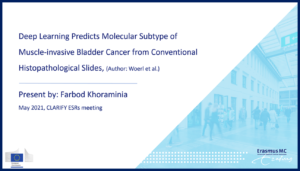A PhD project would be perfect if you do it with other collaborators with different points of view.
ESRs have decided to hold a monthly journal club with twelve of us. All ESRs will present an article that is related to their project. The first presenter was ESR 10 Farbod Khoraminia. He presented an article by Woerl et al. called “Deep Learning Predicts Molecular Subtype of Muscle-Invasive Bladder Cancer from Conventional Histopathological Slides,” published in August 2020.

Woerl et al., in this article, aimed to predict the molecular subtype of a whole slide image of a patient who has MIBC, only using histopathological slides. For this purpose, they adjusted a resNET to make a new algorithm called mibCNN. Using these algorithms, the molecular subtype of each whole slide image could be predicted with high performance. Also, they introduced some histopathological features that were more relevant to their model. Classification of histopathological slides into different molecular subtypes was also compared with pathology experts. Their method had the same or better performance than pathology experts.
Farbod also presented a few points on how to make a good presentation. He categorized them into three groups: general points, detailed points, very detailed points.
General points: Outline your content, plan carefully, who are your audiences? Be on time and keep the timing of your presentation, speak comfortably and confidently.
Detailed point: Header is an abbreviation of your conclusion, don’t distract audiences from your message, use animation only when it is needed, keep it easy, professional, and easy to follow.
Very detailed points: Pick your color scheme, pick your font, arrange your boxes, follow the rules.
Then Farbod talked about research questions in three main fields briefly. What is a research question? Why we need a research question? What is a good research question?
He mentioned that we need research questions to keep us interested, keep us focused on a topic, define what sort of smaller questions we will need to ask, guide what sort of reading we might need to do or gather, guide us to whom to speak for advice.
And about specifications of a good research question, he mentioned: Clear and focused, not too broad, not too narrow, not too easy or difficult to answer, above all being researchable.
Next month another CLARIFY ESR will share with you what she/he will present in the following journal club.
Farbod Khoraminia – ESR10


